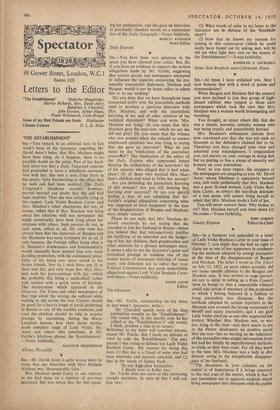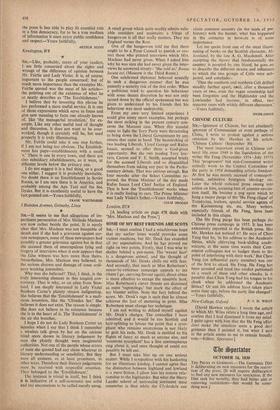SIR,—In a footnote you apPended to a letter of Lady
Violet Bonham Carter in your issue of 'October 7, you imply that she had no right to claim me as one of her supporters in condemn- ing the methods adopted by certain journalists at the time of the disappearance of Burgess and Maclean. The letter I wrote to The Times on July 23, 1952, on press ethics certainly did not make specific allusion to the Burgess and Maclean case. It was written to urge journal- ists not to delay in setting up a Press Council (now in being) so that a responsible tribunal could take action if members of the profession to which I belong behaved in a fashion to bring journalism into disrepute. But the 'methods adopted by certain reporters in the Maclean case aroused the strong resentment of Myself and many journalists, ajd I am glad Lady Violet cited me as one who supported her protest. Whether Mrs. Maclean was, or was not, lying at the time—and there seems to me in the Petrov disclosures no positive proof that she was—has no bearing on the behaviour of the journalists who sought information from her and her family by unprofessional methods, as crude as they were cruel. For all they knew at the time Mrs. Maclean was a lady in dire distress owing to the inexplicable disappear- ance of her husband.
The discussion in your columns on the matter is of importance if it brings attention to the real crux of the matter, which is that if
any journalists use or approve methods which bring newspapers into disrepute with the public the press is less able to play its essential role in a free democracy, for to be a true medium of information it must enjoy public confidence and respect.—Yours faithfully,
Kensington, W8 ARTHUR MANN











































 Previous page
Previous page